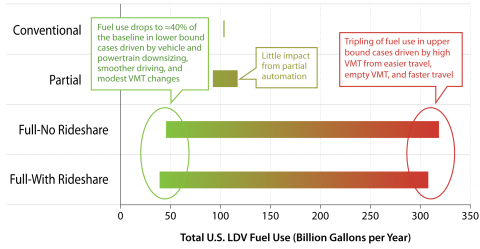SS Forum: Connected and Automated Vehicles – Potential Energy Use Implications
ABSTRACT:

Connected and Automated Vehicles (CAVs) offer potential increases in safety and mobility, but the implications for transportation energy use is very uncertain. A recent review of CAVs studies found a very wide range in the possible energy use by CAVs due to the wide ranges of possible effects on future vehicle efficiency, use, and levels of adoption. Argonne National Laboratory, along with other U.S. Department of Energy Laboratories and collaborators are researching how vehicle connectivity and automation may influence the efficiency and use of future vehicles.
In order to understand the potential influence of CAVs on future energy and greenhouse gas (GHG) emissions, vehicle simulations using the Argonne Autonomie powertrain simulation toolkit and metropolitan area transportation system modeling are being used to simulate CAVs in different contexts. Methods are being developed to take results from such case studies and expand these results to the U.S. national level. Expansion methods will be applicable to vehicle-level simulation results as well as to results of city- or metropolitan-area transportation system modeling. This research effort focuses on three areas: (1) mapping vehicle-level efficiency changes attributable to CAVs capabilities to the entire route network across the U.S., (2) transferring estimated changes in travel patterns, especially in vehicle-miles traveled from activity-based travel demand simulations at a metropolitan area scale to the national scale, and (3) developing analytical methods to model adoption of CAVs technology by different users. Methods will be briefly described, and preliminary results will be presented.
SPEAKER:

Dr. Thomas Stephens is a Transportation Systems Analyst at Argonne National Laboratory in the Systems Assessment Group in the Energy Systems Division. He examines implications of new vehicle technologies for energy use and greenhouse gas emissions over the lifecycles of vehicles and fuels as well as their potential costs and market potential. Of particular interest are technologies such as vehicle automation and connectivity, which have potentially large energy and emissions implications.
He has a master’s degree from the School of Natural Resources and Environment at the University of Michigan and a Ph.D. in Chemical Engineering from the University of Massachusetts. Prior to joining Argonne, he conducted research and development of materials and manufacturing processes and provided production support for various aerospace and defense applications at Los Alamos National Laboratory and the Naval Air Warfare Center.
In 2013 and 2014, he was on assignment to the U.S. Department of Energy (DOE) Vehicle Technologies Office and in 2015 he received the DOE Vehicle Technologies Distinguished Achievement Award for economic, market, and integrated vehicle technology analysis.